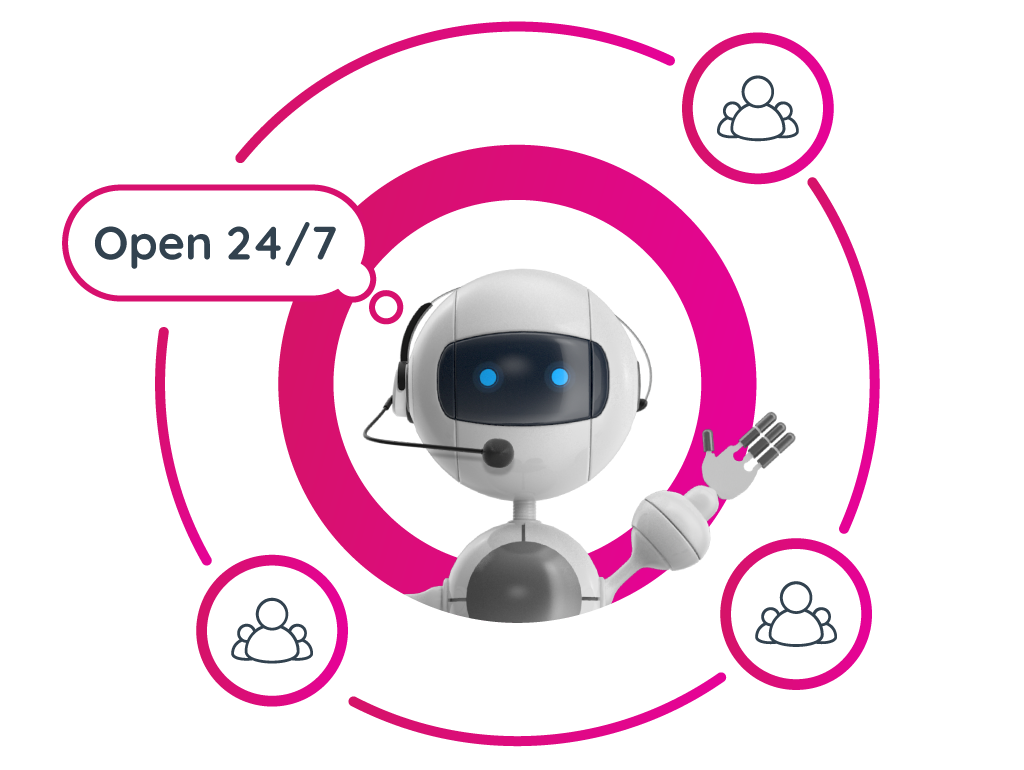Which Business Case Is Better Solved By Artificial Intelligence (AI) Than Conventional Programming?

The current corporate environment has necessitated an examination of which scenarios are better suited to AI resolution than traditional programming. As AI advances, it provides businesses with a wide range of possibilities for making more enlightened decisions and completing activities in an expedited manner. In this blog post, we will delve into the realm of AI and explore its potential in solving various business cases.
We will begin by defining artificial intelligence and discussing its types, characteristics and benefits. Next, we’ll examine how AI can be applied to solve specific business cases and the advantages it brings over conventional programming methods. Moreover, we’ll look at the advantages of using AI compared to standard programming approaches in terms of cost reduction, faster turnaround times, accuracy and efficiency.
However, implementing an AI solution also comes with certain risks. We will address these concerns by exploring security risks associated with implementing an AI system as well as data privacy issues that may arise from such implementations. Finally, we’ll provide guidance on how companies can prepare for a successful implementation of an AI solution in their decision-making processes.
By understanding which business case is better solved by artificial intelligence than conventional programming methods in different scenarios – from identifying high-value customers to enhancing customer service experiences – you can leverage this powerful technology to drive growth within your organization while mitigating potential challenges along the way.
AI in Marketing and Sales

Artificial intelligence (AI) has a significant impact on marketing and sales strategies by analyzing customer behaviors based on past interactions and patterns of successful sales. This allows marketers to tailor their messaging strategies accordingly, leading to higher conversion rates compared with conventional programming methods.
Analyzing Customer Behavior for Personalized Messaging
AI technology has the benefit of quickly and effectively processing large amounts of data. By leveraging machine learning algorithms, businesses can gain insights into customer behavior that were previously impossible or time-consuming using traditional analytics tools. These insights enable marketers to create highly personalized messages that resonate with individual customers, resulting in increased engagement and ultimately higher conversion rates.
Identifying High-Value Customers Through AI Algorithms
In addition to personalizing messaging, AI systems can also help businesses identify high-value customers who are more likely to make purchases or become loyal brand advocates. By analyzing historical purchase data, demographics, online behavior patterns, and other relevant factors, artificial intelligence can predict which customers have the highest potential value for a business. Armed with this information, companies can focus their marketing efforts on these high-potential segments while optimizing resources spent on less profitable groups.
The Power of Predictive Analytics in Marketing Strategies
- Data-driven decision-making: With the help of AI-powered predictive analytics tools like Salesforce Einstein Discovery, businesses can make informed decisions based on real-time data analysis, leading to more effective marketing campaigns.
- Improved customer segmentation: AI algorithms can segment customers based on various factors such as demographics, preferences, and online behavior patterns. This allows businesses to create targeted marketing strategies that cater to the unique needs of each group.
- Better return on investment (ROI): By focusing their efforts on high-value customers and optimizing messaging strategies using AI insights, companies can achieve a higher ROI for their marketing campaigns compared with conventional programming methods.
In the current competitive market, AI utilization in marketing and sales is no longer an option but a necessity for staying on top. By harnessing the power of AI technology in decision-making processes and customer targeting strategies, businesses stand a better chance at outperforming competitors who rely solely on traditional approaches.
AI in marketing and sales has been revolutionized by the introduction of AI algorithms that allow for more accurate customer behavior and sentiment analysis, personalized messaging strategies, and improved identification of high-value customers. By implementing conversational smart chatbots into their digital strategy, businesses can further enhance customer experience through personalization while also increasing revenue numbers.
Key Takeaway:
Artificial intelligence (AI) can solve business cases better than conventional programming by analyzing customer behavior, identifying high-value customers, and using predictive analytics. By utilizing AI in marketing strategies, businesses can achieve higher ROI and improved customer conversion rates, which is a critical factor for success.
Conversational Smart Chatbots

One prime example of how artificial intelligence outperforms conventional programming is the use of conversational smart chatbots. These advanced systems understand user queries and respond with tailored customized messages and answers that have a higher likelihood of conversion compared with generic responses generated by traditional software programs.
Enhancing Customer Experience Through Personalization
The key to providing an exceptional customer experience lies in personalization, which can be achieved through AI-powered chatbots. By analyzing previous interactions and predicting characteristics using machine learning algorithms, these intelligent bots can offer personalized solutions based on individual preferences or needs. Personalization enhances the customer experience and fosters a sense of appreciation, leading to increased loyalty.
Increasing Revenue Numbers via Intelligent Bots
- Predictive Analytics: AI-driven chatbots are capable of predicting customer behavior by analyzing past data patterns, allowing businesses to make informed decisions about potential upselling or cross-selling opportunities.
- Faster Response Times: With their ability to perform tasks simultaneously without human intervention, AI-based chatbots ensure quicker response times for customers – leading to increased satisfaction levels and ultimately higher revenue numbers.
- Data-Driven Insights: As they interact with users over time, smart chatbots gather valuable insights into consumer preferences and behaviors that can be used for targeted marketing campaigns or product development strategies.
Incorporating artificial intelligence into your business’s decision-making processes can significantly improve customer service and boost revenue numbers. By implementing conversational smart chatbots, you’ll be able to provide a personalized experience that caters to each individual’s needs while simultaneously streamlining your operations for maximum efficiency.
Conversational Smart Chatbots have become an integral part of customer experience, providing personalized service and increasing revenue numbers. With the advent of AI technology, Supply Chain Management Optimization has also been revolutionized to predict equipment failure for proactive maintenance and real-time inventory optimization.
Supply Chain Management Optimization

Artificial intelligence excels in managing supply chain operations effectively, predicting equipment failure, or optimizing inventory management processes using real-time data analysis techniques. Companies can significantly reduce operational costs while ensuring smooth functioning throughout their entire production line.
Predicting Equipment Failure for Proactive Maintenance
Incorporating AI-powered predictive maintenance into the supply chain helps businesses make informed decisions regarding equipment upkeep and replacement. By analyzing historical performance data alongside current operating conditions, AI algorithms can identify patterns that indicate potential failures before they occur. This proactive approach allows companies to schedule necessary repairs or replacements ahead of time, minimizing downtime and reducing overall maintenance costs.
Real-Time Inventory Optimization Using AI Technology
Inventory optimization through AI technology is another area where conventional programming falls short compared to artificial intelligence systems. Machine learning models analyze vast amounts of data from various sources such as sales records, customer behavior trends, and external factors like market fluctuations or seasonal demands. With this information at hand, these advanced algorithms continuously adjust stock levels in real-time to ensure optimal availability without overstocking or running out of products.
- Better demand forecasting: AI-driven tools provide more accurate predictions about future product demand based on past sales patterns and other relevant factors.
- Faster decision-making processes: Real-time analytics enable businesses to react quickly when faced with unexpected changes in the market environment.
- Elevated efficiency: Automated inventory management reduces the need for manual intervention, freeing up valuable resources to focus on other high-priority tasks.
By leveraging artificial intelligence in supply chain management, businesses can achieve a competitive edge through streamlined operations and improved decision-making capabilities. This ultimately leads to cost savings and increased customer satisfaction as products are consistently available when needed.
Supply Chain Management Optimization is an area of immense potential for Artificial Intelligence, allowing businesses to streamline their processes and reduce costs. Voice Bots can be utilized to completely transform how companies communicate with their customers, providing enhanced experiences at a reduced cost.
Key Takeaway:
Artificial intelligence is better suited for managing supply chain operations, predicting equipment failure, and optimizing inventory management processes. By leveraging AI technology in these areas, businesses can achieve cost savings and increased customer satisfaction through streamlined operations and improved decision-making capabilities. This proactive approach allows companies to schedule necessary repairs or replacements ahead of time, minimizing downtime and reducing overall maintenance costs.
Customer Service Revolutionized by Voice Bots
Artificial intelligence has transformed the way businesses handle customer service, particularly through the implementation of AI-powered voice bots. These advanced systems are capable of understanding callers’ concerns and providing appropriate resolutions without any input from human operators. This not only saves time but also significantly reduces operational costs.
Reducing Wait Times for Improved Satisfaction Levels
The use of AI-driven voice bots in call centers can drastically reduce wait times for customers seeking assistance. Instead of being put on hold or transferred to multiple agents, customers can now get their issues resolved quickly and efficiently by interacting with intelligent voice bots that understand their queries and provide relevant solutions. As a result, this leads to higher satisfaction levels among customers who appreciate prompt and effective support.
Constantly Learning & Improving Capabilities Due to Machine Learning
AI’s capability to continually learn from past experiences is a key feature. In the context of customer service, this means that AI-powered voice bots can analyze previous interactions with clients and adapt accordingly to offer even better support over time. By leveraging machine learning algorithms, these systems become more proficient at handling various types of inquiries as they gain experience – ultimately leading to improved performance across all aspects of customer service operations.
- Better decision-making: With access to vast amounts of data collected during client interactions, AI-driven voice bots can make informed decisions when resolving issues – resulting in faster response times and increased accuracy compared with conventional programming methods.
- Fewer errors: Since these systems rely on sophisticated algorithms rather than human input, the chances of making mistakes are significantly reduced – ensuring that customers receive accurate information and support at all times.
- Scalability: AI-powered voice bots can handle multiple calls simultaneously without compromising on quality or efficiency. This allows businesses to scale their customer service operations effortlessly as they grow and expand into new markets.
Incorporating artificial intelligence into customer service departments has revolutionized the way businesses make decisions, perform tasks, answer, and interact with clients. By leveraging advanced AI algorithms and machine learning techniques, companies can now provide exceptional support while reducing operational costs – ultimately leading to increased satisfaction levels among their valued customers.
Customer Service Revolutionized by Voice Bots has improved customer satisfaction levels and reduced wait times significantly. Automation is the next step in eliminating payroll errors, allowing businesses to streamline their operations with fewer mistakes.
Key Takeaway:
Artificial intelligence-powered voice bots have transformed customer service by reducing wait times, constantly learning and improving capabilities through machine learning, making informed decisions based on vast amounts of data collected during client interactions, and handling multiple calls simultaneously without compromising quality or efficiency. This has resulted in improved performance across all aspects of customer service operations while reducing operational costs for businesses.
Eliminating Payroll Errors Through Automation
By leveraging AI and machine learning, businesses can reduce payroll errors while improving efficiency through automation. Traditional methods often involve manual data entry and calculations, which can lead to errors that cost businesses both time and money. By leveraging AI algorithms and machine learning capabilities, companies can significantly reduce these inaccuracies while improving overall efficiency.
Automated Data Entry for Accurate Calculations
AI-powered payroll systems are designed to automatically collect employee work hours, benefits information, tax deductions, and other relevant data points from various sources within the organization. This automation not only streamlines the process but also ensures accurate calculations by eliminating human error in data entry.
Error Detection through Machine Learning Algorithms
In addition to automating data collection and input processes, AI technology enables real-time analysis of payroll records using advanced machine learning algorithms. These intelligent systems can identify potential discrepancies or anomalies in employee payments before they become a costly issue for businesses. For example, an AI system may flag unusual overtime patterns, ensuring that employees are compensated fairly without overpaying them due to miscalculations or miscommunications.
Faster Processing Times & Enhanced Compliance Measures
- Faster Processing: With automated workflows powered by artificial intelligence algorithms in place, organizations experience reduced turnaround times when it comes to processing payrolls. This allows businesses to make timely payments, ensuring employee satisfaction and loyalty.
- Enhanced Compliance: AI systems are designed to stay up-to-date with the latest tax regulations and compliance requirements, which can be a challenge for conventional programming methods. By automating these updates, companies can ensure they remain compliant while avoiding potential penalties or fines associated with non-compliance.
In summary, integrating artificial intelligence into payroll processing offers numerous benefits that surpass traditional methods in terms of accuracy, efficiency, and overall cost savings. By leveraging advanced AI algorithms and machine learning capabilities within their operations, businesses can eliminate common payroll errors while streamlining their decision-making processes for improved financial outcomes.
Key Takeaway:
Artificial intelligence (AI) can help businesses automate complex tasks like payroll processing, reducing inaccuracies and improving efficiency. AI-powered systems can collect employee data from various sources, identify potential discrepancies using machine learning algorithms, ensure compliance with tax regulations and enhance overall accuracy while saving time and money.
FAQ
Which business case is better solved by AI than conventional programming?
AI is better suited for solving complex problems that involve large amounts of data, pattern recognition, and prediction. Examples include fraud detection, customer segmentation, natural language processing, and image recognition.
Which case would benefit from explainable artificial intelligence (AI) principles?
Cases involving critical decision-making by humans or where transparency is required would benefit from explainable AI principles. This includes healthcare diagnostics, financial risk assessment, and criminal justice systems where understanding the reasoning behind decisions is crucial.
In which situation would Accenture apply principles of responsible AI?
Accenture applies responsible AI principles in situations where ethical considerations are paramount. These may include projects with potential biases in data sets or algorithms or those impacting vulnerable populations such as children or minority groups.
What is a benefit of applying artificial intelligence (AI) to Accenture’s work?
Applying AI to Accenture’s work can lead to improved efficiency and accuracy in processes like data analysis and decision-making while reducing costs associated with manual labor-intensive tasks. It also enables innovative solutions tailored to specific client needs.
Conclusion
AI is a potent tool that can process business cases with higher accuracy and efficacy than traditional programming. By understanding the benefits of AI, companies can make informed decisions about which business cases are best suited for this technology.
Implementing an AI solution involves identifying clear goals and objectives, developing a comprehensive plan, addressing potential issues beforehand, and being aware of potential risks such as security breaches or data privacy concerns. However, the cost savings, time savings, and accuracy gains with AI versus conventional programming make it worth considering ai solutions for many businesses.






